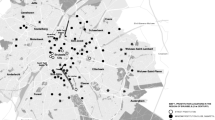Abstract
In 1911 a new public morality act was enacted in the Netherlands. Article 250bis of the penal code states that it is forbidden to give opportunity for prostitution. This so called article on brothelkeeping was the result of growing pressure of a coalition between christian puritans, socialists and feminists at the end of the nineteenth century. In the nineteeneighties the government has proposed to scratch this general prohibition of brothelkeeping. This proposal results from another coalition, this time between feminists and bureaucratic powers. This change in the public debate on prostitution, and especially the influence of feminism, is analysed from a moral point of view. The Dutch prostitution issue is seen as a case of postmodern morality, that is to say as a result of bureaucratic needs for regulation and subjective experiences of the persons involved.
Similar content being viewed by others
References
Altink, S., “Stedelijke bevolkingspolitiek tussen lusten en lasten”, Marge 1982 (11), 333–339.
Altink, S., Huizen van illusies; bordelen en prostitutie and middeleeuwen tot heden (Utrecht, 1983).
Barry, K., Female Sexual Slavery: From Prostitution to Marriage (Englewood Cliffs, N.J.: Prentice Hall, 1979).
Berg, P.M.W. van den, J.T.I., Scholtes, A.A., Mentink, Prostitutie in Nederland; een inventarisatie in 176 Nederlandse gemeenten (Amsterdam: Mr. A. de Graafstichting, 1978).
Foucault, M., The History of Sexuality: Vol. I, An Introduction (New York: Pantheon Books, 1978).
Giesen, R., G., Schumann, An der Front des Patriarchats (Bensheim: Päd. extra Buchverlag, 1980).
Hekma, G., Homoseksualiteit, een medische reputatie; de uitdoktering van de homoseksueel in negentiende-eeuws Nederland (Amsterdam: SUA, 1987).
Jaget, C. (ed.), Prostitutes Our Life (Une vie de putain) (Bristol: Falling Wall Press, 1980).
Kiedrowski, J.S., J.J.M.vanDijk, Pornography and Prostitution in Denmark, France, West Germany, The Netherlands and Sweden (Ottawa: Department of Justice; Policy, Programs and Research Branch, 1984). Working papers on pornography and prostitution, report 1.
McIntosh, M., “Who needs prostitutes? The ideology of male sexual needs”, in C.Smart and B.Swart (eds.), Women, Sexuality and Social Control (London: Routledge and Kegan Paul, 1978).
Melai, A.L., Derde interimrapport prostitutie; commissie zedelijkheidswetgeving ('s-Gravenhage: Staatsuitgeverij, 1977).
Millett, K., The Prostitution Papers (Dutch edition: Amsterdam: Meulenhoff, 1975).
Overman, L., Prostitutie in woonwijken (Amsterdam: Mr. A. de Graafstichting, 1982).
Pheterson, G., The Whore Stigma: Female Dishonour and Male Unworthiness (Den Haag: Ministerie and Soziale Zaken en Werkgelegenheid, 1986).
Prostitutie en maatschappelijk werk; rapport van de commissie “maatschappelijk werk en prostitutie”; uitgebracht in opdracht van het Nationaal Comité van Instellingen voor Zedelijke Volksgezondheid (Amsterdam: Nationaal Comité van Instellingen voor Zedelijke Volksgezondheid, 1964).
Rorty, R., Contingency, Irony and Solidarity (Cambridge: Cambridge University Press, 1989).
Scholtes, J.T.I., Prostitutie, gegevens en ideeën (Amsterdam: Mr. A. de Graafstichting, 1980).
Scholtes, J.T.I., “De staat als zedenmeester: artikel 250bis Wetboek van Strafrecht en de Rotterdamse seksschepen”, Intermediair 1981 (22) 1–9.
Stemvers, F.A., “Geslachtsziektenbestrijding 1850–1880”, in Tijdschrift Geschiedenis van de geneeskunde, natuurwetenschappen, wiskunde en techniek 1981 (4) 1–24.
Stemvers, F.A., Meisjes van plezier; de geschiedenis van de prostitutie in Nederland (Weesp: Fabula-Van Dishoeck, (1985).
Stoffels, J., Prostitutie en strafrecht; rapport van de commissie ingesteld bij besluit van de Minister van Justitie van 21 maart 1962 (Den Haag): Stafafdeling Wetgeving no. 88/662, 1962).
Sijmons, D., De prostitutiequaestie (Utrecht: University of Utrecht, 1976).
Sijmons, D., “Een noodzakelijk kwaad, maar voor wie? Prostitutie in Nederland in de tweede helft van de negentiende eeuw”, in Jaarboek voor vrouwengeschiedenis (Nijmegen, SUN, 1980).
Tweede Kamer der Staten-Generaal, Afschaffing van de bijkomende straf van plaatsing in een rijkswerkinrichting benevens wijziging van de strafbepaling betreffende souteneurschap ('s-Gravenhage, Tweede Kamer 18202 (6), 1985–1986).
Vanwesenbeek, I., “De subjektiviteit van het objekt; prostituées en autonomie”, Tijdschrift voor vrouwenstudies 1986 (27).
Volmuller, H.W.J., Het oudste beroep; geschiedenis van de prostitutie in Nederland (Utrecht, Oosthoek, 1966).
Walkowitz, J.R., “The politics of prostitution”, in Signs: Journal of Women in Culture and Society 1980 (1) 123–135.
Walkowitz, J.R., Prostitution and Victorian Society: Women, Class and the State (Cambridge, Cambridge University Press, 1980b).
Werff, C.van der and A.A.van derZee-Nefkens, De commerciële sexbedrijven in Nederland: een inventarisatie van verschijnselen en nevenverschijnselen ('s-Gravenhage, WODC, 1977).
Author information
Authors and Affiliations
Rights and permissions
About this article
Cite this article
Boutellier, J.C.J. Prostitution, criminal law and morality in the Netherlands. Crime Law Soc Change 15, 201–211 (1991). https://doi.org/10.1007/BF00196722
Issue Date:
DOI: https://doi.org/10.1007/BF00196722




